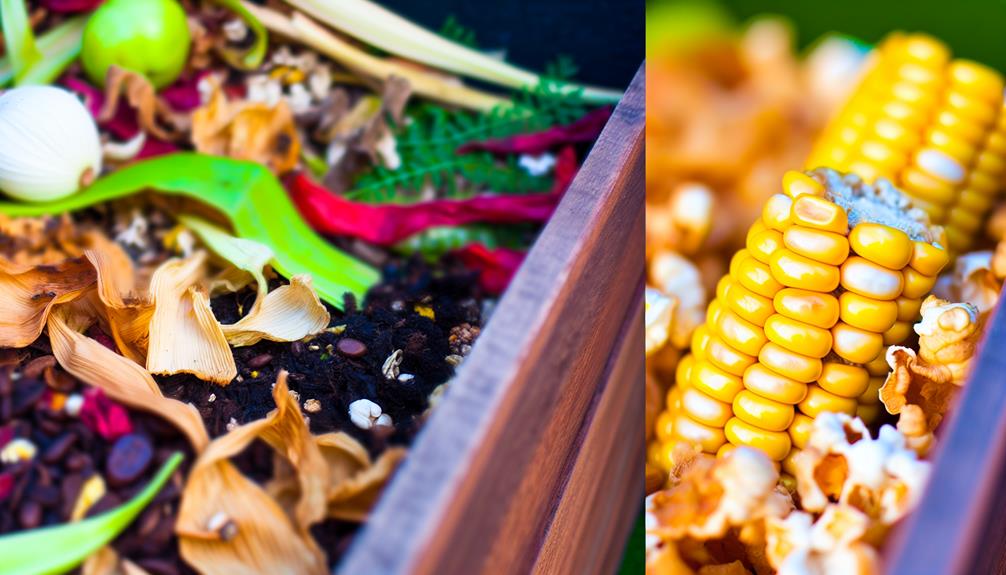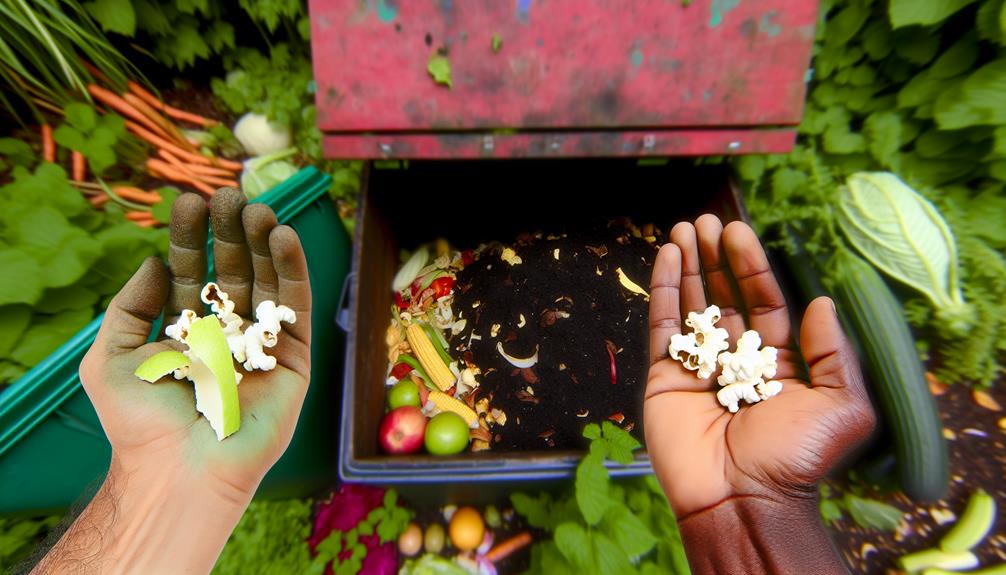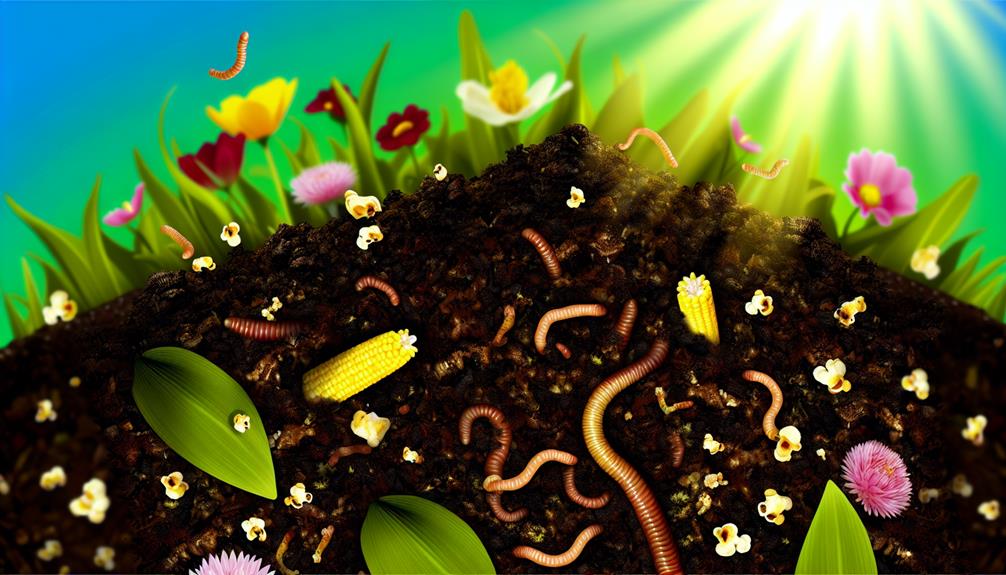

Yes, you can compost popcorn. Plain, air-popped popcorn is ideal, whereas lightly salted varieties are also acceptable. Avoid heavily buttered or flavored popcorn due to the added oils. Before composting, remove excess butter, and crush the kernels to aid decomposition. Mix the popcorn with nitrogen-rich materials like vegetable scraps and keep the compost pile slightly damp, similar to a wrung-out sponge.
Regularly turn the pile to enhance aeration and breakdown. This process not only reduces waste but also enriches your soil with essential nutrients, improving structure and fertility. There are key considerations and best practices to secure positive outcomes.
Popcorn can be a great addition to your compost pile if you know the basics. Composting is all about balancing green and brown materials to create rich, fertile soil.
Popcorn, with its simple ingredients, fits well into this process. Whether it’s a few unpopped kernels or leftover popcorn from movie night, you can compost it effectively.
First, consider the popcorn ingredients. Plain, air-popped popcorn without any added butter, oils, or artificial flavorings is ideal. These can break down easily in your compost pile. If your popcorn has salt or butter, it’s best to avoid composting it as these ingredients can attract pests and slow down decomposition.
To incorporate popcorn into your compost, start by mixing it with other green materials like vegetable scraps and coffee grounds. The popcorn adds bulk, while the greens provide nitrogen. Remember to balance this with brown materials such as dry leaves or cardboard to maintain the right composting basics.
Turn your compost pile regularly to guarantee proper aeration and faster decomposition.
When selecting types of popcorn to compost, plain air-popped varieties are your best bet. This type of popcorn decomposes efficiently without contributing any unwanted additives to your compost pile.
Avoiding buttered popcorn and heavily seasoned varieties is important, as these can introduce oils and synthetic substances that hinder the composting process.
Here’s a quick guide on what types of popcorn you can compost:
Buttered popcorn should generally be avoided, as the fats and oils can attract pests and disrupt the composting process. Also, flavored popcorns with cheese, caramel, or other toppings aren’t recommended, as they introduce non-organic components that can complicate decomposition.
Also Read: Can You Compost Rust?
To prepare popcorn for composting, start by removing any excess butter and salt, as these can attract pests and slow decomposition.

Next, break down the popcorn kernels to speed up the composting process.
Before composting, you’ll want to remove any excess butter from the popcorn to prevent attracting pests and creating an imbalance in the compost pile. Butter, while delicious on popcorn, can introduce unnecessary fats that aren’t ideal for composting.
To guarantee your compost thrives, let’s focus on effective butter removal and explore butter alternatives.
First, shake off loose butter by placing the popcorn in a colander and giving it a gentle toss. This helps to dislodge any surface butter.
Next, consider these steps to make the process easier:
Now that the butter’s been removed, it’s time to break down the kernels to guarantee they compost effectively. Breaking down the kernels speeds up kernel decomposition and ensures your composting timeline stays on track. Start by lightly crushing the popcorn kernels with a rolling pin or similar tool. This increases the surface area, making it easier for microbes to do their job.
Next, consider soaking the crushed kernels in water for a day or two. The soaking process softens the kernels, providing a head start for decomposition once they’re in the compost pile.
Here’s a quick breakdown:
| Step | Action | Purpose |
|---|---|---|
| 1 | Crush the kernels | Increase surface area |
| 2 | Soak in water | Soften kernels |
| 3 | Add to compost pile | Initiate decomposition |
| 4 | Monitor moisture | Ensure ideal conditions |
| 5 | Turn compost regularly | Promote even decomposition |
Regularly mixing crushed and soaked popcorn kernels with green materials like vegetable scraps and grass clippings is essential for balanced composting. By doing this, you guarantee that your compost pile maintains the right composting balance and nutrient ratio for effective decomposition. Popcorn kernels alone are carbon-rich browns, so combining them with nitrogen-rich greens is key.
Here’s a quick guide to achieve that perfect mix:
Balancing browns and greens is vital for the microbial activity that breaks down organic matter. If you notice your compost isn’t breaking down well, adjust the ratio. Too many browns can slow the process, while too many greens can make it soggy and smelly. Aim for a balanced mix to create nutrient-rich compost for your garden.
Also Read: Can You Compost Candle Wax?
When composting popcorn, you should watch out for potential issues like mold growth and attracting pests. Popcorn can decompose in your compost pile, but it may invite unwanted guests if not managed properly.
To minimize pest attraction, avoid adding popcorn that’s heavily buttered or salted. These ingredients can be a magnet for rodents and insects.
Mold growth is another concern. Popcorn can retain moisture, creating an environment where mold thrives. To combat this, make sure your compost pile is well-aerated. Turn it regularly to promote even decomposition and discourage mold formation.
Also, try to mix popcorn with a balanced amount of ‘greens’ like vegetable scraps or coffee grounds. This mix helps maintain the right nitrogen-to-carbon ratio, which is essential for efficient composting.
Keep your compost pile covered if possible. A lid or tarp can help deter pests and regulate moisture levels. Regularly check the pile for any signs of excessive dampness or unwanted visitors.
If you spot mold or pests, adjust the pile’s moisture levels and aeration accordingly. By staying vigilant, you can successfully compost popcorn without these common issues.
Also Read: Can You Compost Cactus?
Composting popcorn enriches your soil with valuable nutrients, enhancing the health and productivity of your garden. By adding popcorn to your compost heap, you’re contributing to soil enrichment and reducing the environmental impact of waste. Popcorn, primarily organic material, breaks down into essential compounds that foster robust plant growth.

Here’s how composting popcorn benefits you and your garden:
To maximize the benefits of composting popcorn, follow these practical tips to guarantee a thriving compost pile.
First, confirm your compost maintains proper moisture levels. Popcorn, like other organic materials, needs a balanced environment to decompose effectively. Aim for a consistency similar to a damp sponge; too dry, and the decomposition process slows down, too wet, and you risk foul odors and unwanted pests.
Next, focus on compost aeration. Turning your compost pile regularly introduces oxygen, which is essential for the microorganisms breaking down the popcorn and other materials. A well-aerated pile will decompose more efficiently and produce rich, earthy compost faster.
Additionally, balance your compost ingredients. Popcorn is a carbon-rich material, so mix it with nitrogen-rich materials like vegetable scraps or grass clippings. This balance helps maintain the necessary microbial activity for efficient decomposition.
Remember to shred or break down larger pieces of popcorn before adding them to your compost. Smaller pieces decompose more quickly and evenly, contributing to a healthier compost pile.
You shouldn’t compost flavored popcorn because the buttery residue and artificial flavorings can harm your compost’s balance. Stick to plain, unflavored popcorn to keep your compost healthy and share sustainable practices with your community.
You might wonder if microwave popcorn packaging is compostable. Unfortunately, it’s often not due to chemical coatings and non-biodegradable packaging materials. It’s better to recycle or dispose of it properly, keeping our community green.
When composting popcorn, you’ll notice it has a lower nutrient value and faster decomposition time compared to other food waste. By including it, you contribute to a community effort of maintaining efficient, balanced compost piles.
Yes, popcorn can attract pests to your compost pile. However, using pest deterrents and practicing good compost management, like turning the pile regularly, helps keep your compost community thriving and pest-free.
You’ll notice a difference in nutrient contribution and decomposition rate. Popped kernels break down faster and add more immediate nutrients. Unpopped kernels take longer to decompose but eventually contribute nutrients too. Happy composting, friends!
To sum up, you can compost popcorn, but make sure it’s plain and unseasoned. Break down large pieces and mix them well with other compost materials to avoid clumping.
Watch for potential issues like pests and mold. Composting popcorn adds valuable organic matter to your pile, enriching the soil.
Follow these tips, and you’ll successfully incorporate popcorn into your compost, enhancing its quality and sustainability. Remember, attention to detail guarantees effective composting.
